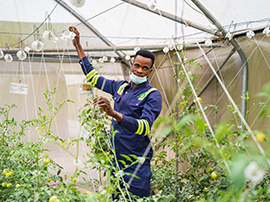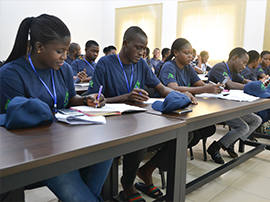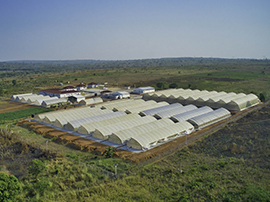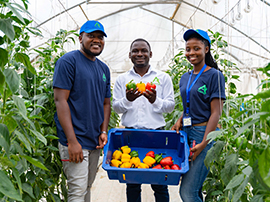One of the major challenges facing agriculture in Ghana is attracting young people to the profession, who are deterred by the outdated farming methods. Today, many agricultural graduates find themselves working in other sectors; the loss of which counts towards the increase in food imports in recent years.
Greenhouse technology, which is a fast-developing system of vegetable production in sub-Saharan Africa, seeks to stem the flow of graduates from the sector. Greenhouses separate crops from harsh environmental conditions, resulting in the year-long cultivation of vegetables. The resulting increase in productivity is viewed by younger agriculturalists as a more attractive form of farming. Knowledge and skills gained in this area can also be applied in the field.
To encourage this interest, the Ministry of Food and Agriculture (MoFA), overseen by the Ghana Irrigation Development Authority (GIDA) and managed by Agritop, has set up the Greenhouse Capacity Building and Training Center (GCBTC) at Dawhenya in the Greater Accra Region of Ghana. GCBTC is a unique agricultural training facility, where young people, with some level of agricultural education, learn how to become successful growers. A cohort of 30 students, plus trainers and managers, enjoy a supportive learning environment, with well-furnished accommodation, office space, a library, a lecture hall and a laboratory. GCBTC is a self-sufficient scheme, where proceeds from produce grown at the center fund the students’ training costs.
Dawhenya’s clay soil and challenging climate suit few crops, making vegetable production difficult. GCBTC is deploying advanced greenhouse technology to overcome this by preparing the community to be a leading producer of high-quality vegetables. This expansion of Dawhenya’s local economy will, in turn, present opportunities for inhabitants and improve lives.
The total growing area at GCBTC is 3Ha. Practical training in agricultural technology and innovation takes place in six 210 metre-square tunnels.
The PAC thirteen-week course equips trainees with the knowledge, attitude, practice and skill needed to manage a farm business efficiently. The well-structured curriculum covers: land preparation, nursery management, transplanting, irrigation, fertilization, crop protection, agro-techniques and post-harvest. Special emphasis is placed on the production of high-value vegetables like tomato, cucumber and sweet pepper. A certificate is issued after successful completion of the part-theoretical/part-practical program.
The commercial farm, from which the training center is financed, consists of a 15,000m2 greenhouse and open fields. Produce is grown in the main production area, along with a hydroponic greenhouse and a nursery structure. The farm also includes a fertigation control center, a maintenance structure, a pack house and a postharvest center. Although the consumption of vegetables in urban areas is increasing, consumers remain concerned about the safety of fresh produce. The GCBTC commercial farm seeks to produce a constant supply of healthy vegetables that are fit for consumption all year long, thereby reducing the reliance on vegetable imports from abroad.
How the GCBTC benefits Ghana:
The college will offer one major course that will last three (3) months in Ghana practical work in green house and.
The course will aim to provide knowledge in modern farming including irrigation, fertilization, agro techniques, crop protection, post-harvest procedures, data collection and decision-making practice, “best agro practice” methodologies and practices.
Course Overview




